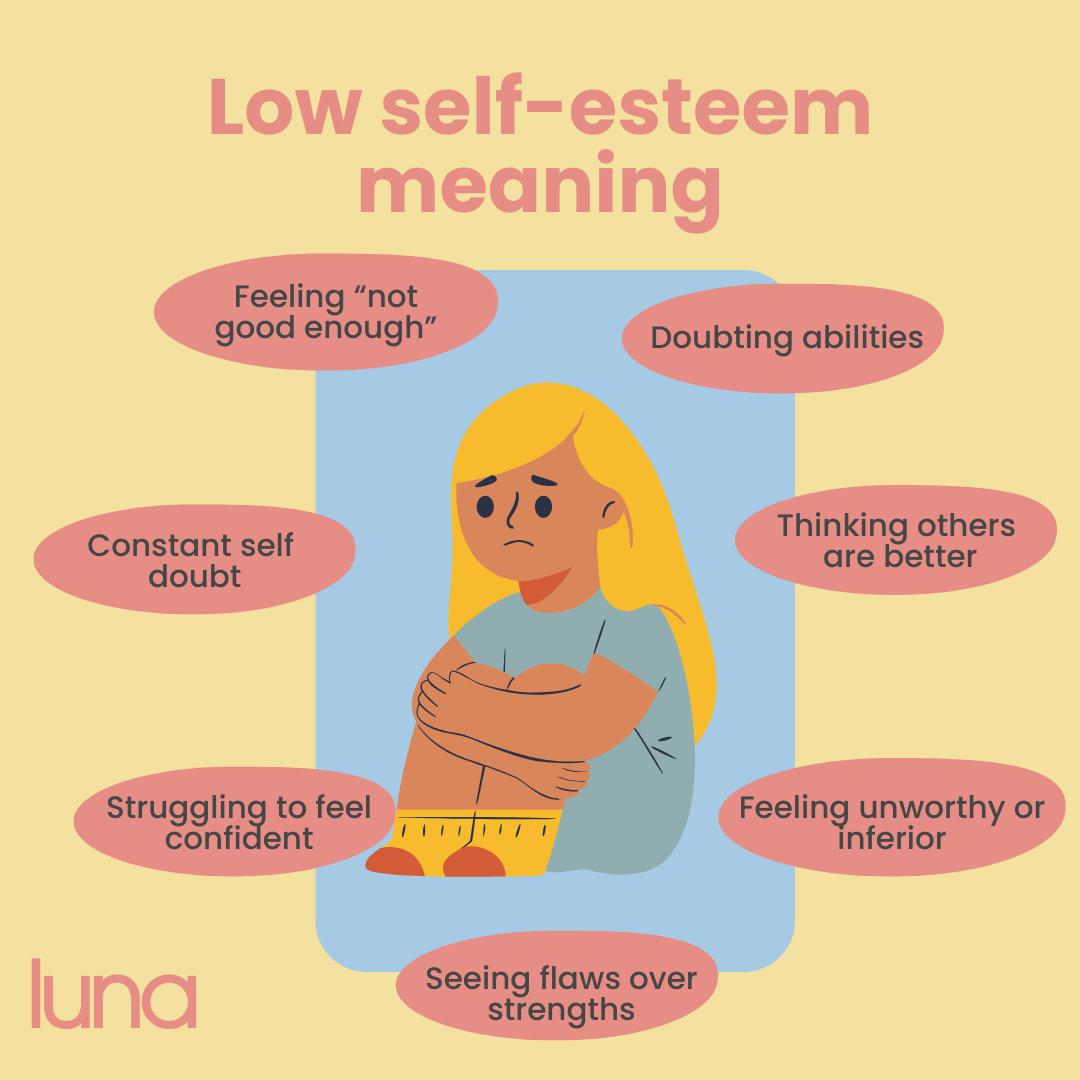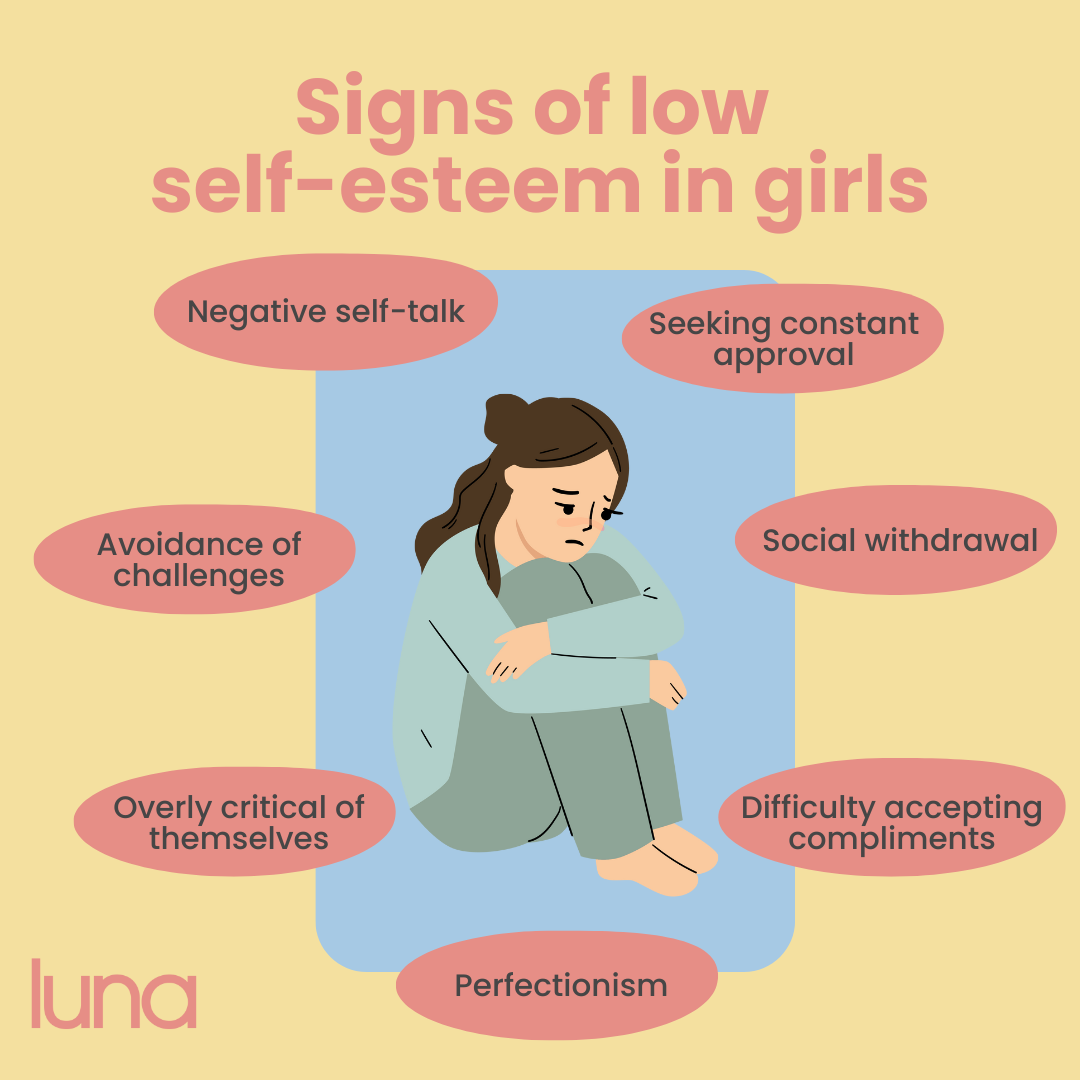Explaining low self-esteem in teens
Is your teen lacking confidence?

Updated December 4, 2025 • Medically reviewed by Dr. Emma Dickie
Medically reviewed by Dr. Emma DickieIn this article
Quick summary
- Teens who are struggling with low self-esteem may engage in negative self-talk, avoid challenges, seek constant approval, withdraw socially, or struggle with perfectionism and self-criticism
- Teenage low self-esteem can be influenced by unrealistic beauty standards and social comparisons online, peer pressure, academic and social dynamics at school, the impact of social media, and insecurity
- To support your teen, foster open communication, offer positive reinforcement, model self-compassion, encourage healthy risk-taking, and promote self-care habits

As a parent, understanding and supporting your child's emotional and psychological wellbeing can be challenging, especially with the emotional rollercoaster that puberty can trigger.
A big part of this is recognising signs of low self-esteem and self-confidence struggles, which we’ve learned are very common in luna’s teen community, and so we want to give you some advice on how to spot the signs and how best to support them.
Low self-esteem meaning
Low self-esteem describes how a young person sees and values themselves, and specifically, when that inner view becomes overly negative, harsh or insecure.
For teens, self-esteem isn’t just about confidence. It shapes how they make decisions, handle challenges, and relate to friends, school, and their own body.
A teen with healthy self-esteem tends to feel capable, accepted and worthy.
A teen with low self-esteem often doubts their abilities, questions their value, and assumes others see them negatively too.

It’s important to acknowledge that low self-esteem is not a personal failing.
Many parents recognise the feeling themselves, and adolescence is a particularly vulnerable time because so much is changing at once.
From what we hear every day at luna, the pressures teens face today are more intense and more constant than in previous generations.
A teen’s self-esteem can be shaped by:
- What they see online: especially beauty standards, comparison culture and filtered perfection
- What they hear from peers: comments about appearance, popularity or performance
- What they experience at school: academic pressure, friendship shifts, social hierarchy
- How they engage with social media: where likes, views and messages can feel like measures of worth
- What they go through during puberty: physical changes, hormone shifts and identity formation
Against that backdrop, it’s understandable that many young people struggle.
But with the right support, teens can learn to develop a more balanced, self-compassionate view of themselves.
As a parent, understanding what low self-esteem really is – and what can influence it – helps you spot early signs and step in with reassurance, guidance and grounding when your teen needs it most.
Teenage low self-esteem statistics in the UK
- 61% of girls aged 10-17 in the UK have low self-esteem
- 52% of UK youth feel satisfied with their health
- 35% of UK teens have skipped meals due to concerns about their body image
- 37% of adolescents in the UK feel upset or ashamed of their body image
Signs of low self-esteem in teenagers
To be able to be there for your teen, it's a good idea to be familiar with the signs of low self-esteem in teenagers.
Since we all know this can be tricky, here are some signs of low self-esteem in teens that you should watch out for.

Negative self-talk
A teen may frequently put themselves down, criticising their appearance, abilities, or worth.
Phrases like "I'm not good enough" or "I can't do anything right" are red flags.
Avoidance of challenges
Teens may often shy away from new experiences or challenges due to a lack of belief in their abilities.
This can stem from a fear of failure or rejection
Overly critical of themselves
Whilst self-criticism is important for personal growth, those with poor self-esteem may be excessively harsh on themselves, unable to acknowledge their strengths and achievements
Seeking constant approval
A teen may constantly seek validation and approval from others, relying heavily on outside opinions to feel good about themselves.
Social withdrawal
A teen may withdraw from social activities or friendships/relationships.
Possibly stemming from feeling unworthy of others' attention or fear of being judged.
Perfectionism
While striving for high standards is not an inherently negative trait, extreme perfectionism may signal poor self-confidence.
Teens might feel that they need to be perfect to be accepted or valued.
Difficulty accepting compliments
A teen might struggle to accept compliments, often dismissing or downplaying them, possibly rooted in an internal belief that they are not deserving of praise.
Low self-esteem examples in teens
Understanding how low self-esteem can show up in your teen’s day-to-day life can make it easier to recognise when they’re struggling.
Here are some real-life examples of what low self-esteem might look like:
Avoiding social events
Your teen might turn down invitations to parties, clubs, or group activities because they worry they won’t fit in or fear being judged by others.
Giving up easily
Whether it’s schoolwork, hobbies, or sports, they may stop trying quickly, saying things like “What’s the point? I’ll fail anyway.”
Overthinking mistakes
A small slip-up – like answering a question wrong in class – may spiral into hours of self-blame or embarrassment, long after everyone else has forgotten it.
Comparing themselves to others
Your teen may frequently compare how they look, perform, or behave to their peers or influencers online, usually concluding they fall short.
People-pleasing
They might go out of their way to keep others happy, even at the expense of their own needs, because they fear rejection or disappointing someone.
Reluctance to try new things
They might avoid joining new clubs, applying for opportunities, or exploring new interests because they doubt their ability to succeed.
Difficulty making decisions
Even simple choices – like what to wear or what to eat – can feel overwhelming when a teen fears making the “wrong” choice.
Harsh self-judgement after feedback
Constructive criticism from teachers, coaches, or even family members might feel devastating, reinforcing their belief that they’re “not good enough.”
How to help a teenager with low self-esteem
Building self-assurance and fostering self-compassion in your teen to boost their low self-esteem involves creating a supportive and nurturing environment.
Some ways to help include:
Open communication
Create a safe space for your teen to express their thoughts and feelings. Listen actively and empathetically without judgement.
We've also got a guide for talking to your teen about their mental health if you need.
Positive reinforcement
Highlight and celebrate your teen's strengths and achievements. Offer genuine praise and encourage them to recognise their worth.
If they're struggling with body image in particular, luna's got a guide on boosting your teen's body image.
Model self-compassion
Show your teen what self-compassion looks like by treating yourself kindly and forgiving your own mistakes, alongside encouraging others in the household to behave the same way.
This sets a powerful example for your teen to follow!
Encourage healthy risk-taking
Support your teen in trying new things and stepping out of their comfort zone – this may even involve accompanying them on certain experiences that may be especially nerve-racking for them.
Celebrate their efforts and resilience, regardless of the outcome!
Teach self-care
Encourage habits that promote physical and mental wellbeing, such as regular exercise, good quality sleep, and mindfulness practices.
Seek professional help if it becomes too much
If your child is really struggling even with the advice above, it may be worth speaking to them about getting professional help.
Professional mental health support can build your child’s psychological resilience and tackle their issues head on in an effective manner.
You can speak to a GP about this in the first instance, and they may refer you elsewhere or offer advice themselves.
Some of the core foundations of self-esteem are formed in the teenage years.
By being attentive to the signs of low self-esteem and taking proactive steps to nurture your teen’s self-assurance, you can help them develop a strong and healthy sense of identity.
Remember, your support and understanding play a crucial role in your teen’s journey towards becoming a confident and resilient young adult.
How luna can boost your daughter's self-esteem
A sense of belonging can help to restore your teens' self-esteem by providing support and connection.
And that's where luna comes in.
luna helps teens by offering a safe space to ask questions, learn from medical experts, and more.
We're helping teens by:
- Providing resources on body image, mental health, and confidence-building
- Offering a safe space to ask personal health and wellbeing questions
- Assisting teens to develop self-awareness through tracking tools
- Equipping parents with insights to support their teen’s self-esteem via a newsletter
- Building a sense of belonging and connection through a supportive community

How we created this article:
luna's team of experts comprises GPs, Dermatologists, Safeguarding Leads and Junior Doctors as well as Medical Students with specialised interests in paediatric care, mental health and gynaecology. All articles are created by experts, and reviewed by a member of luna's senior review team.
Sources:
NHS "Raising low self-esteem" | Accessed 04.12.25
https://www.nhs.uk/mental-health/self-help/tips-and-support/raise-low-self-esteem/CAMHS "Low self-esteem" | Accessed 04.12.25
https://www.camhsnorthderbyshire.nhs.uk/low-self-esteemWe'd love to keep in touch!
Sign up to our parent newsletter for emails on the latest teen trends, insights into our luna community and to keep up to date
By signing up, you are agreeing that we can use your email address to market to you. You can unsubscribe from marketing emails at any time by using the link in our emails. For more information, please review our privacy statement.